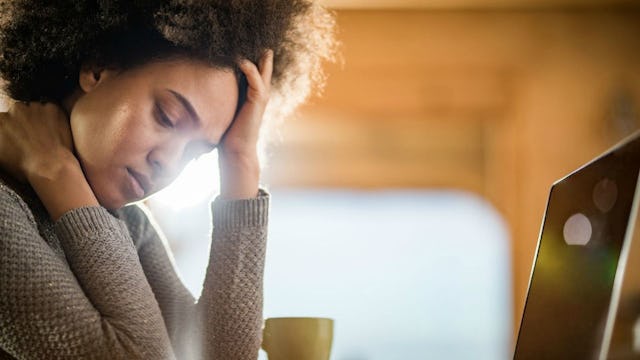Stop Telling People With Depression They Shouldn't Be Depressed

The first time my anxiety was misunderstood was when I was in high school.
A group of eight girls were staying the night at the house of one of our friends. It was nearing midnight, and we arranged pillows and blankets on the bedroom floor, stomachs full of strawberry Pop-Tarts. We were giggling about the IM exchange we’d had with a guy from school, when one friend suggested that we go for a drive. The 16-year-old among us picked up the keys to her mom’s minivan.
It was a balmy spring night, perfect for a drive. Everyone but me cheered and threw on shoes, while I sat on my friend’s bed, familiar panic setting in. Our town curfew for teens was midnight. What if we went for a drive and got pulled over? What if my parents found out I’d broken the rules? What if we wound up with a flat tire on a winding country road with no one to help us? What if, even worse, we got into a car accident?
As my friends were happily chatting and heading out the door, I said to one friend, “I’m not going.” She looked at me funny and asked what the big deal was. I mumbled something about the curfew, and she replied, “Chill out!” before sauntering out the door.
I stayed behind and cried.
I didn’t know then that the chronic stomachaches, the never-ending thoughts of doom, and the moments where my heart was racing and I felt that I couldn’t catch my breath were classic signs of anxiety.
I had decided I was what others felt I was. A Nervous Nelly. A Goody-Goody. A stick-in-the-mud. I can’t count the number of times I was told to “take a chill pill” and stop worrying.
But when you live with mental illness, you can’t just turn it off or talk yourself out of what’s going on in your head. That’s not how it works.
I quickly learned that voicing my concerns and objections ostracized me, so I started pushing my worries down deeper and deeper. This led to me avoiding a lot of situations in which my anxiety would be called out. I sensed that concealing my anxiety was safer and socially acceptable.
Plus, I had a good life, and people weren’t afraid to remind me of that fact. It was their way of implying that I shouldn’t be struggling. After all, there were other people all around me who were so much worse off.
My childhood was idyllic. My parents (who are still married) and two younger siblings and I lived in a comfortable home. I earned a few college scholarships, spending five years working up to a master’s degree. I married my high school sweetheart, and now we have four children. We live in a family-oriented community and have great jobs.
But here’s the truth. Anxiety and depression do not discriminate. They don’t prowl around seeking to sink their claws into those with the most difficult situations. Genes, brain chemistry, and trauma can all be contributing factors as to why some of us live with mental illness and some do not.
Depression and anxiety are beasts. They don’t care how badly you do not want them or what you had planned. There are many forms, but no matter the type a person has, it’s persistent and difficult, like a toddler in a toy store who won’t take no for an answer.
The truth is, many women suffer from anxiety, depression, or both. In fact, women are twice as likely to have depression than men. Factors including PMS, pregnancy, menopause, work overload, and abuse can be contributors.
I was in my thirties before I was officially diagnosed with anxiety. I’d done a lot of research into my symptoms and talked to a few trusted friends before working up the courage to see my doctor.
I discovered all of my options. Some women take prescription medication while others have found relief through supplements, CBD oil, or marijuana. Some exercise or practice mindfulness. Others opt for cognitive behavioral therapy, attending a support group, or taking up a new hobby.
Not only did having a diagnosis and treatment plan help, but the more I opened up to others about my anxiety, the more others shared their own struggles with me. Sharing my diagnosis gave them permission to reveal theirs. Together we established a sense of unity and support.
Of course, my anxiety didn’t magically go away just because I chose to share that I had it. In fact, I was met with more unsolicited advice by some. Why can’t I just pull myself up by my bootstraps, toughen up, and be grateful for what I do have? Why not take on the approach of “Don’t worry, be happy”? Why do I not just chill the hell out?
Trust me. If it were up to me, anxiety wouldn’t be part of my life. But since it is, I made a decision. I refused to go back to being a scared teenage girl who felt she had to become smaller and quieter so I didn’t make others uncomfortable. Instead, I claim my anxiety as part of who I am.
I’m hopeful that with powerful female celebrities like Lady Gaga and Taraji P. Henson speaking up about their experiences with mental illness, society will move in the right direction. When a woman reveals her mental health struggles, she’ll be met with empathy and community, not unsolicited, uneducated, and unsupportive advice.
It’s time to prioritize our mental health and say good-bye to the nay-sayers.